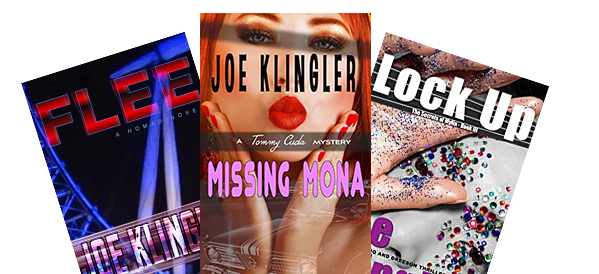Interview with Book Goodies
Visit Book Goodies For More
BG: What inspires you to write?
JK: Reading and disturbance.
Reading: I’ve learned so much from books that I’ve been able to apply directly to my life to help me make better decisions, to live life more fully, and to appreciate all the good things from a milkshake to a promotion to a gentle kiss. A desire to be a part of this world of words keeps me writing.
Disturbance: When something in the world, society, my town disturbs me, it gets inside my body and bangs around and demands that I examine it as if it were a precious gem instead of the lump of coal I see at first glance. The process of developing a story with a disturbance at its heart helps me uncover the gem, and maybe walk a mile in the moccasins of everyone in the story to understand how it touches them. What opportunities they really have. How they make a decision. Through this process I learn about what I really think about the situation. For RATS the disturbance was a child being injured by leftover war ordnance. For Mash Up, it was not only the challenge of living in a world of digital copying, but also the actions Silicon Valley takes to exploit humans through technology.
BG: Tell us about your writing process.
JK: A book usually comes to me not as a full blown end-to-end story, but as a scene, or several key scenes, that depict the turning points, or points of departure for who the characters are, and what they have to face.
I’ve tried outlining from these initial ideas, but when outlining the plane is too high and I can’t see the ground.
I learned a method from the book Lessons from a Lifetime of Writing by David Morrell that he called an Authors Dialog. I sit down and have a conversation with myself about the book. And ask questions as if I’m talking to another author asking about his or her book. For example:
What’s your book about?
Why is that interesting?
Who are the key characters?
What happens first?
Then what?
How does that resolve itself?
Where does it take place?
Why there?
If I sit for a few hours each day for a week or so, and type in the questions and then type in my answers, I get a pretty good description of how the book will unfold before I start writing it. This list of ideas and concepts help keep me on track through rough spots. And yes, I always veer away from “the plan,” but the plan is critical to the process.
It’s quite difficult to write a detailed Author Dialog, but the question/answer process that Mr. Morrell suggests is a natural way to stimulate your mind to think deeply about your story. We’re wired to ask questions about our future (Will it rain? Will she go out with me? What should I have for dinner? Am I in the right profession?); asking the right ones is good practice.
BG: Do you listen to or talk to your characters?
JK: No, I inhabit them. When writing a scene I visualize (and hear and smell and taste and feel the motion of vehicles) not as if I were watching a movie, but as if I am having the experience. I hold the revolver in one hand and the throttle in the other and weave the motorcycle through traffic with one eye on the yellow lines flashing below and the other on the silver Ferrari I’m trying to catch. I try to experience everything they feel, everything they think, everything they touch or smell, and most important, everything that motivates them to move forward with their decisions and actions.
BG: What advice would you give to other writers?
JK: Try to know, as best you can, why you are writing. Not just because you feel like it. But what are you trying to achieve? Are you trying to write a bestseller? (Please read best sellers and biographies of how their authors got to that position). Do you just want to put words to paper to free your soul? (That is an admirable goal, but then try not to worry about unit sales.)
Or are you trying to make a living? (Take a good look at how many books most people sell and calibrate your expectations. Also, consider the level of effort you will have to put into marketing your work, to reach your goal. Simply be aware that rarely does anyone write a book, put it on Amazon, and it instantly becomes a best seller. Has this happened? Yes. People win the lottery too.
Understand how few books most writers actually sell. But few is relative. If 3,000 people read your work, will you feel satisfied? How about 30,000? How about 300,000?
BG: How did you decide to publish your books?
JK: I spent some time writing query letters and kept writing the next book the entire time I was waiting for responses. I attended a presentation at the Squaw Valley Writers Conference and the speaker (a writer) said, “Whatever else you’re doing, be sure you’re writing every day.”
So I did some querying and received lukewarm responses. But then I happened on Joe Konrath’s blog “The Newbies Guide to Publishing” that explains a great deal about the publishing industry, how it works, and why self-publishing can be a good option for writers. I also had a conversation with an agent who said, “If you can sell 10,000 copies, I can get a publisher interested.” Given those two pieces of data, I decided to self-publish and keep writing. I’m still doing it, and enjoying it immensely.
BG: What do you think about the future of book publishing?
JK: To me, publishing breaks down along technology lines (big publishing houses, paper books, warehouses, bookstores, print on demand, eBooks, eReaders are all technology to solve the problem of getting words to the reader).
So long as paper books being sold in thousands of bookstores is with us, the Big 5 Publishers will be important, because they currently provide the means to reach that market. Many people prefer paper. I suspect many will continue to prefer paper, and there will be publishers to serve them.
But enter “print on demand.” It is now possible to create a paperback (or hardcover) book after the customer places an online order, and ship it within days. This is yet a different technology for putting paper books into the hands of readers, and it is now to the point that the quality compares favorably to traditional publishing.
But eBooks are their own market. Readers who like eBooks are rarely going to a bookstore to get them. The majority get them from Amazon, Apple, Kobo, Barnes & Noble. Ebooks have the advantage of low purchase price, and the instant gratification of buying a book and having it downloaded immediately without driving to the bookstore to see if they have the book you want in stock. There is also the issue of incredible availability. Amazon puts millions of eBook titles at your fingertips.
Also, the eBook market splits between purchase, and the subscription models such as Kindle Unlimited from Amazon.
I think all three markets will be important for the foreseeable future: paper (bookstores and print on demand), eBooks for purchase, and eBook subscriptions. How the three balance out will depend on what readers like, and how each delivery mechanism is priced.
BG: Any additional thoughts for other writers?
JK: Please don’t go it alone. Yes, writing is a solitary effort, but there are ways to get assistance. Engage a professional editor even if you can only afford the first hundred pages. An editor will ask hard questions of your manuscript, as will a group of trusted beta readers. These extra eyes will see things you won’t no matter how long you look, because they are bringing themselves to the table. Listen carefully, then use what you feel is true and correct for your story.
Start a newsletter, so you have direct contact with your readers. Get help with marketing. Hire a cover designer. Use every free promotional tool you can find, from social networks to free (or 99¢) eBooks. In general, get all the help you can, then focus on finishing the next book. For career development, nothing replaces having more books.
Joe Klingler’s books are available exclusively on Amazon.com
Join Joe's Mailing List
Sign up for Joe’s newsletter below for periodic updates, special offers and exclusive content.

